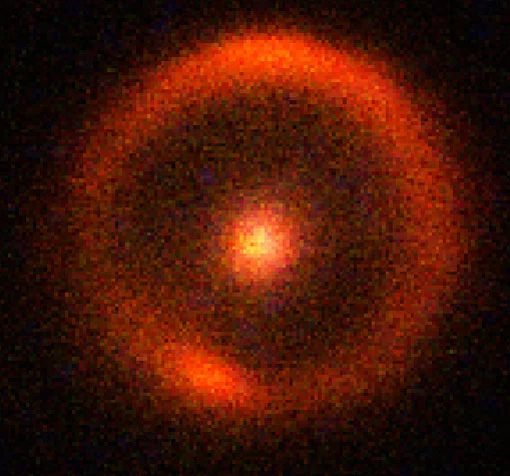Recently, researchers made an exciting discovery about a dark galaxy located approximately 10 billion light-years away from Earth. This galaxy, although classified as a “dark dwarf galaxy,” has very unique characteristics that are causing scientists to reconsider their understanding of the formation and evolution of galaxies in the universe. This discovery is significant not only because of its distant location but also because it sheds light on “dark matter,” one of the biggest mysteries in the cosmos.

“We have discovered an extremely distant dark galaxy. This is the second time such a galaxy has been observed outside our local region,” Simona Vegetti, a member of the research team, said in a paper published in Nature on January 18, 2012. This is one of the most fascinating discoveries about dwarf galaxies, as they do not produce many stars or even any stars at all, which makes them “dark” in the vastness of the universe.
Researchers used the Keck-II telescope at Mauna Kea, Hawaii, to observe this phenomenon. The technique they employed is called “gravitational lensing.” This technique allows scientists to observe distant galaxies by finding nearer galaxies that can bend the light from galaxies located behind them. When the light is bent, the researchers can detect dark galaxies around the primary galaxy.
“This discovery not only confirms the existence of dark galaxies but also opens a new way to test cosmological models, particularly the cold dark matter model,” Professor Leon Koopmans, one of the study’s authors, shared in a report published in Nature. These results could change the way we view galaxy formation, especially regarding the role of dark matter in the process.
Another interesting point is that the research team used the data they collected to develop hypotheses about galaxy formation, particularly dark dwarf galaxies. They suggest that these small galaxies could contain dark matter, making them difficult to detect. This is a prime example of using advanced technologies in space exploration to uncover things that we could previously only theorize about.
“These discoveries represent a major step forward in our understanding of the universe and dark matter, opening a new era in astronomical research,” Simona Vegetti added.
This not only enhances our understanding of the universe but also sparks curiosity and the desire to explore. If you are passionate about astronomy and the cosmos, this is certainly an opportunity to participate in astronomical observation events or follow promising space missions that will be launched in the future. This discovery shows that there are still many fascinating aspects of the universe waiting for us to explore.


HPX24h > Space > Scientists Discover Dark Galaxy Located 10 Billion Light-Years from Earth
Top Reads from This Category
Space
Jupiter-Like Planets: The Key to Unlocking Earth-Like Worlds
Space
The Relationship Between Star Formation and the Activity of Supermassive Black Holes
Space
3D Lunar Map: A New Gateway to Understanding the Universe
Space
The Youngest Recorded Supernova: Unveiling the Mystery of a Star’s Death
Space
Exploring Gravitational Forces and the Evolution of the Universe
Space
Scientists Believe Water Ice Could Exist on the Giant Asteroid Vesta
Space
The Smallest Star System with Three Exoplanets Found by NASA’s Kepler
Discover New Topics
Fitness
Post-Workout Muscle Soreness: Tips to Relieve Pain and Stay Motivated in Your Fitness Journey
Science
Artificial Intelligence Outperforms Humans in Treating Depression
Science
Regrowing Adult Teeth in Just 9 Weeks: Science Turns the Impossible into Reality
Healthy Eating
Health is ‘Declining’ Due to Processed Foods: How to Turn the Tide
Healthy Eating
Longevity Diet: The Key to Nutrition That Helps Extend Lifespan
Fitness
Walking or Running: Which Is Better for Health and Weight Loss?
Health
Forgetfulness Can Bring Unexpected Evolutionary Benefits
Science
Enhancing Memory with Brain Implants: A New Scientific Revolution
Parenting Tips
Talking to Children About Race: How to Make It Easier?
Animals
The Stunning Image of a Cheetah in Action During Its Hunt
Healthy Eating
Moderate Coffee Consumption Helps Reduce the Risk of Diabetes and Cardiovascular Diseases
Healthy Eating
Does Bone Broth Really Help Relieve Joint Pain and Improve Skin?
Animals
Rats Help Each Other: When Compassion Emerges from Small Creatures